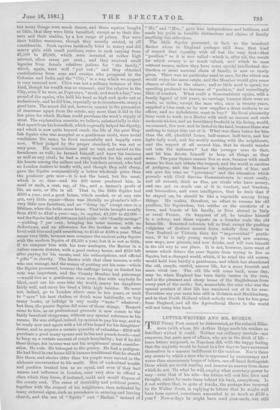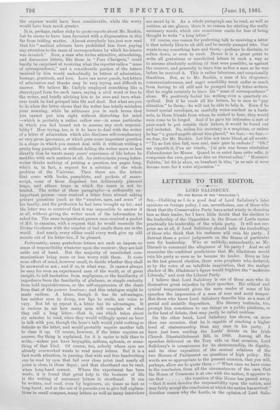familiar) wished it could. Neither can ordinary mortals—not e
to keep up a certain amount of rough hospitality ; but if he did emperors, but mere men of affairs, who are in the thick of life—
leave letters unopened, as Napoleon did, with the happy feeling that the majority would be found in a few days to have answered themselves in a manner indifferent to the receiver. Nor is there any means by which a man who is oppressed by unnecessary and the expense would have been considerable, while the worry would have been much greater.
It is, perhaps, rather risky to quote reports about Mr. Ruskin, but he seems to have been favoured with a dispensation in this far from trifling matter. Almost everybody has just now read that his "medical advisers have prohibited him from paying any attention to the mass of correspondence by which his leisure was invaded." Now, a man who writes attractive, stimulating, and discursive letters, like those in "Fors CIavigera„" could hardly be surprised at receiving what the reporter calls a "mass of correspondence," and a considerable portion of the letters received by him would undoubtedly be letters of admiration, homage, gratitude, and love. Love can never _puzzle, but letters of admiration and thanks may be very trying and difficult to answer. We believe Mr. Carlyle employed something like a stereotyped form for such cases, saying a civil word or two to the writer, and briefly advising him to be sure and turn what- ever truth he had grasped into life and deed. But what are you to do when the letter shows that the writer has totally mistaken your meaning, while he addresses you in such terms that you cannot put him right without disturbing his mind —which is probably a rather callow one—in some particular in which you feel bound not to assume any such responsi- bility P How trying, too, is it to have to deal with the writer of a letter of admiration which also discloses self-complacency or very gross ignorance, or which puts some important question in a shape in which you cannot deal with it without writing a pretty long pamphlet, or without telling the writer more or leas directly that he wants many years' experience of life before he meddles with such matters at all. An enthusiastic young letter- writer thinks nothing of putting a question, ten pages long, which is, in fact, a request for a solution of the whole problem of the Universe. Then there are the letters that come with books, pamphlets, and packets of manu- script, some of them disguised but deliberately planned traps, and others traps in which the snare is not in- tended. The writer of these paragraphs—a sufficiently un- important person—once received a letter from abroad asking private questions (such as the "number, ages, and sexes" of his family, and, the profession be had. been brought up to); and the letter was so contrived that it was impossible to answer it at all, without giving the writer much of the information he asked for. The same insignificant person once received a packet of MS. to examine, with a request that he would reconcile the Divine Goodness with the number of bad smells there are in the world. And nearly every editor could every week give up odd secrets out of his letter-box, if he pleased.
Fortunately, many gratuitous letters are such as impose no sense of responsibility whatever upon the receiver ; they are laid aside out of hand. But the majority of unsolicited com- munications bring more or less worry with them. It costs some effort of mind, however small, to decide whether they shall be answered or not ; and if so, in what way. It cannot always be easy for even an experienced man of the world, or of great insight, to tell hesitation from negligence, or the familiarity of impudence from the familarity of gladness, or simple curiosity from bold inquisitiveness, or the self-suppression of tho cheat from that of the pauvre km/tem ; and this catalogue might be made endless. A letter, though it has its advantages, has neither eyes to droop, nor lips to smile, nor voice to vary. But let us repeat it, a letter has its advantages. It is curious to see how many men will complain of what they call a long letter,—that is, one which takes about six minutes to read, when they would willingly spend an hour in talk with you, though the hour's talk would yield nothing so definite as the letter, and would probably require another talk to clear it up. Of course, however, if the letter requires an answer, the thing is explained, for it is easier to talk than to write,—unless you have laryngitis, asthma, aphonia, or some- thing of that kind. Of course, too, nobody whose eyes are already overworked wants to read many letters. But it is a fact worth attention, in passing, that wide and free handwriting can be read by eyes that fail over close print (and nearly all print is close, in these days) ; and that shorthand can be read, when long-band cannot. Where the experiment has been made, it is found that great help in the business of life is the writing of necessary letters in shorthand. It can be written, and read, oven by beginners, six times as fast as long-hand; and as the use of it permits you to give full explana- tions in small compass, many letters as well as many interviews are saved by it. As a whole paragraph can be read, as well as written, at one glance, there is no reason for stinting the really necessary words, which one sometimes omits for fear of being thought to write "a long letter."
Of course, one reason for preferring talk to receiving a letter is that nobody likes to it still and be merely pumped into. One wants to say something here and there,—perhaps to disclaim, to soften down, or even to snub. Hence it is a great point to write all gratuitous or unsolicited letters in such a way as to assume absolutely nothing (if that were possible), as against the receiver, and generally to leave him as free a man as he was before he received it. This is rather laborious, and occasionally thankless. But, as to Mr. Ruskin, a man of his eloquence, communicativeness, and eager sensibility must suffer so much from having to sit still and be pumped into by letter-writers, that he ought certainly to leave his "mass of correspondence" alone. We positively forbid his writing even a quarterly en- cyclical. But if he reads all his letters, he is sure to "pay attention" to them,—he will not be able to help it. Even if he issued special envelopes, as carefully water-marked as a bank- note, to those friends from whom he wished to hear, they would soon come to be forged. And if he gave his intimates a sort of pass-mark to put outside their letters, it would be found out and imitated. So, unless his secretary is a magician, or unless he has " a guard angelic about him placed," we fear,—we fear,— we fear, for Mr. Ruskin. Let him not taste blood, at all events. " Tu as fort bien fait, mon arai, mais gare la rechute !" Oh
me repartit-il, d'un air r6solu, pris tine ferme r6solution d'abandonner lea Muses. Quand tu es entrt:S dans cette salle, je composais des vers, pour leas dire un 4ternel adieu." Monsieur Fabrice,' lui dit-je alors, en branlant In t6te, je ne sais si nous devons 11011S fier i votre abjuration."'

































 Previous page
Previous page